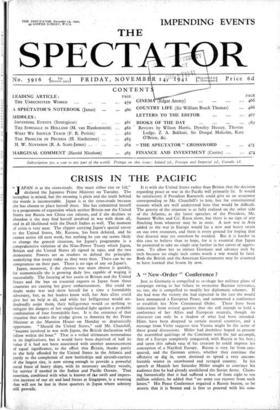CRISIS IN THE PACIFIC
j
" APAN is at the cross-roads. She must either rise or fall," Japan, moreover, if she chooses war must choose it quickly, for economically she is growing daily less capable of waging it successfully. The freezing of her assets in Britain and the United States and the ban on essential. exports to Japan from those countries are causing her grave embarrassment. She could no doubt make war and show herself for a time a formidable adversary, but, as her leaders know well, her Axis allies could give her no help at ill, and while her belligerence would un- doubtedly assist them, their belligerence would tic, nothing to mitigate the dangers of her single-handed fight against a probable combination of four formidable foes. It is the existence of that situation that makes the pledge given to America by the Prime Minister at the Mansion House. on Monday so dramatically opportune. " Should the United States," said Mr. Churchill, "become involved in war with Japan, the British declaration will follow within the hour." That is a veiled ultimatum tremendous in its implications, but it would have been deprived of half its value if it had not been associated with another announcement of equal significance, to the effect that Britain, thanks partly to the help afforded by the United States in the Atlantic and partly to the-completion of new battleships and aircraft-carriers of the largest size, is now strong enough to provide a powerful naval force 'of heavy ships, with its necessary ancillary vessels, for-service --if needed in the Indian and Pacific Oceans. That assertion, combined with -what is known of tke swift and impres- sive increase of our air and land forces at Singapore, is a warning that will not be lost in those quarters in ,Japan where sobriety still prevails. It is with the United States rather than Britain that the decision regarding peace or war in the Pacific will primarily lie. It would be satisfactory if President Roosevelt could give us an assurance corresponding to Mr. Churchill's to him, but for constitutional reasons which are well understood here that would be difficult. The gravity of the situation is as fully realised on the other side of the Atlantic, as the latest speeches of the President, Mr. Sumner Welles and Col. Knox show, but there is no sign of any flinching from whatever may be in store. A new war in Asia added to the war in Europe would lay a new and heavy strain on our own resources, and there is every ground for hoping that that disaster may. `yet somehow be avoided. But it is harder in this case to believe than to hope, for it is essential that Japan be permitted to take no single step further in her career of aggres- sion. To allow her to imitate Germany and advance inch by inch because no single inch seems worth a war would be fatal. Both the British and the American Governments may be assumed to have learned that lesson by now.






















